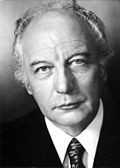| |||||||||||||||||
| |||||||||||||||||
| |||||||||||||||||
An indirect presidential election (officially the 6th Federal Convention) was held in West Germany on 15 May 1974. Though not term limited, incumbent Gustav Heinemann chose not to seek a second term. The government parties (SPD and FDP) nominated Vice-Chancellor Walter Scheel; the Christian Democratic Union nominated Richard von Weizsäcker. Scheel won the election by 32 votes on the first ballot. [1] He served as president until 1979. [2] Weizsäcker would later serve as president from 1984 to 1994. [3]

